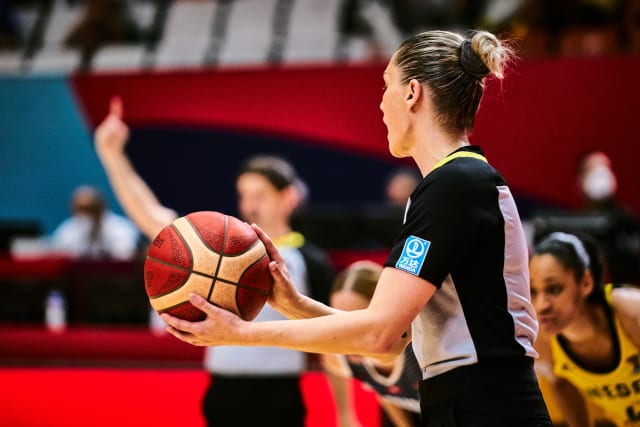Silva, Nikogossyan living dream as referees at FIBA Women's Basketball World Cup
MIES (Switzerland) - The FIBA Women's Basketball World Cup 2022 represents the ultimate level of the game with teams, players and coaches. But the same goes for referees who will be officiating games.
MIES (Switzerland) - The FIBA Women's Basketball World Cup 2022 represents the ultimate level of the game with teams, players and coaches working their whole lives to reach and experience this moment. But the same goes for Andreia Silva and Yana Nikogossyan, two of the 12 women referees, out of total of 23, who will be officiating games in Sydney.
And just like the players and coaches having taken their journey to represent their country on the biggest stage, so too is the case for the Brazilian Silva and Nikogossyan from Kazakhstan.
"I began as a player, but there was a small detail: I had no skill. But I loved the game and I found a way to still be involved with basketball," Silva said. "I started my career working in some U15 games for a time. After that, I worked my way up, with FIBA giving me a lot of opportunities."
The 42-year-old Silva holds a Black License and is one of the most consistent and experienced referees in FIBA competitions. She officiates consistently both women's and men's competitions. and she has already officiated at many major events. Among her past events are numerous FIBA AmeriCups, FIBA Women's Basketball World Cup 2018, as well as men's and women's games at the Tokyo 2020 Olympic Games.

The 32-year-old Nikogossyan meanwhile holds a Green License from 2019 and will be a rookie at the FIBA Women's Basketball World Cup level. But she has shown high-level potential after officiating at the FIBA Women's Asia Cup 2021, FIBA U17 Basketball World Cup 2022 and FIBA Women's Basketball World Cup Qualifying Tournament 2022 in Serbia.
But whereas Silva found officiating as a way to stay in the game, refereeing was a childhood dream for Nikogossyan, whose father Matevos Nikoghosyan was a professional referee and the first male FIBA referee in the history of Kazakhstan.

"My father traveled a lot, he was Head of Referees in Kazakhstan, and I always wanted to become the first female FIBA referee in the country too," said Nikogossyan, who started refereeing at 18.
Nikogossyan's father passed away when she was 27 and it was at that moment when she committed herself entirely to officiating. "I promised that he would be proud of me, that I would definitely become a FIBA referee because I really love officiating, I love basketball," she said.
Silva and Nikogossyan are examples of FIBA pushing one of its strategic priorities for the working cycle of 2019 to 2023 to have more Women in Basketball across all aspects of the game.
Numbers from the end of 2021 show, thanks to more National Federations submitting candidates, that there was a 50 percent increase in female referee applicants for the Game Officials licensing (2021-2023) and 192 were licensed - a 31 percent jump compared to the number of female referees licensed from 2019-21. Additionally, more female referees received Black Licenses, making them eligible to officiate international games for all senior and junior levels.

All referees around the world have been forced to deal with the changing game.
"The game today is a little faster, more technical, the players are stronger and taller. For the officiating teams to accompany these changes, FIBA provides training and programs, such as physical preparation, webinars about rules, game study, meetings - things that help us keep ourselves in tune with modern basketball," Silva said.
"The requirements for players change, and we referees must change too. We must be on the same wavelength because we are the same participants in the game, but with our functional duties. Therefore, it's great that FIBA is doing everything for our development - a lot of webinars that capture all aspects of the game, including mental preparation," Nikogossyan said.
Silva and Nikogossyan both love officiating and the game and everything that comes along with it. And that love of the work is crucial for any aspiring female referee.

"To be a referee is a profession, and it must be taken seriously from the start. Having great physical training, knowledge of the rules, and a focused mindset are essential," Silva said. "To become a referee is to open a window for great opportunities to meet new people and other countries, and also different places while doing what you love."
Nikogossyan added: "I would advise aspiring female referees to love what they do. Nothing will work without the love to be a referee. Don't give up, work hard, and develop."
And eventually, they could reach the highest level in the game and participate in the FIBA Women's Basketball World Cup.
Click here to view the full list of referees for the FIBA Women's Basketball World Cup 2022.
FIBA